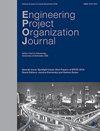从项目管理到“项目管理”
Q3 Engineering
引用次数: 0
摘要
本文认为,有三个主要的动机促使Peter Morris发展项目管理(MoP)作为传统项目管理的替代方法:第一,需要提高项目管理的绩效和实践;第二,需要了解历史、背景和社会面临的挑战;第三,需要参与理论和学术研究。本文借鉴了彼得的三个主要的单一或共同撰写的书籍,这些书籍构成了他在MoP上工作的语料库。本文章由计算机程序翻译,如有差异,请以英文原文为准。
From Project Management to the ‘Management of Projects’
This paper suggests that were three main motivations driving Peter Morris to develop
the Management of Projects (MoP) as an alternative approach to traditional project
management: first, the need to improve the performance and practice of project management; second, the need to understand the history, context and challenges facing society; and third the need to engage with theory and scholarship. The paper draws upon Peter’s three main single or co-authored books which form the corpus of his work on MoP.
求助全文
通过发布文献求助,成功后即可免费获取论文全文。
去求助
来源期刊

Engineering Project Organization Journal
Engineering-Engineering (miscellaneous)
CiteScore
2.00
自引率
0.00%
发文量
0
 求助内容:
求助内容: 应助结果提醒方式:
应助结果提醒方式:


